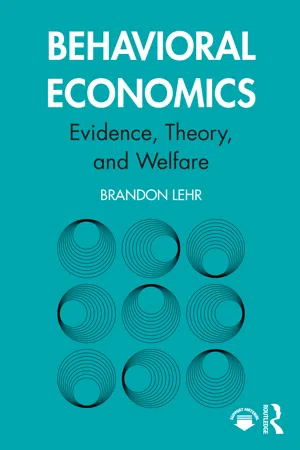
- 600 pages
- English
- ePUB (mobile friendly)
- Available on iOS & Android
About this book
Behavioral Economics: Evidence, Theory, and Welfare provides an engaging and accessible introduction to the motivating questions, real-world evidence, theoretical models, and welfare implications of behavioral economics concepts. Applications and examples — from household decisions, finance, public finance, labor, business, health, development, politics, education, energy, and sports — illustrate the broad relevance of behavioral economics for consumers, firms, markets, and policy makers alike.
This textbook provides readers with both the intuition and analytical tools to apply behavioral economics concepts in understanding the complex social world. Each part of the book covers a key concept, beginning with a range of empirical evidence that is anomalous within the standard economics framework. In light of this evidence, a second chapter introduces and applies a nonstandard behavioral modeling approach. The last chapter of each part explores market reactions and policy responses to individuals behaving in nonstandard ways. Numerous exercises of varying types and levels provide readers the opportunity to check and enrich their understanding.
The book's clear structure orients readers to the many concepts of behavioral economics. It also highlights the process by which economists evaluate evidence and disentangle theories with different social welfare implications. Accessible to students from diverse economic backgrounds, this textbook is an ideal resource for courses on behavioural economics, experimental economics and related areas. The accompanying Solutions Manual further extends learning and engagement.
Frequently asked questions
- Essential is ideal for learners and professionals who enjoy exploring a wide range of subjects. Access the Essential Library with 800,000+ trusted titles and best-sellers across business, personal growth, and the humanities. Includes unlimited reading time and Standard Read Aloud voice.
- Complete: Perfect for advanced learners and researchers needing full, unrestricted access. Unlock 1.4M+ books across hundreds of subjects, including academic and specialized titles. The Complete Plan also includes advanced features like Premium Read Aloud and Research Assistant.
Please note we cannot support devices running on iOS 13 and Android 7 or earlier. Learn more about using the app.
Information
Part IFoundations
1Introduction
- ★ Be motivated to explore behavioral economics.
- ★ Reflect on the role of psychological realism in economics, now and in the past.
- ★ Be aware of the organizing principles for this book.
- ★ Understand the logic and experimental methods for empirical analysis.
1.1 Why Study Behavioral Economics?
- Generality: the model can be applied across many economic settings.
- Tractability: the model is sufficiently simple in the sense that it can be worked with using standard tools of mathematics and does not rely on large-scale computations to generate insights.
- Realism: the model is grounded in the psychological reality of human behavior.
1.2 Why Behavioral Economics Now? A Brief History
Table of contents
- Cover Page
- Half Title Page
- Title Page
- Copyright Page
- Dedication Page
- Table of Contents Page
- Empirical Evidence from the Field, by Topic Page
- Note to Instructors Page
- Acknowledgements Page
- Part I Foundations
- Part II Intertemporal Preferences
- Part III Reference-Dependent Preferences
- Part IV Preferences over Uncertainty
- Part V Social Preferences
- Part VI Beliefs
- Part VII Decision Processes
- Index